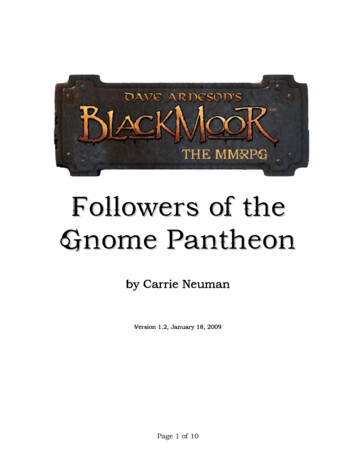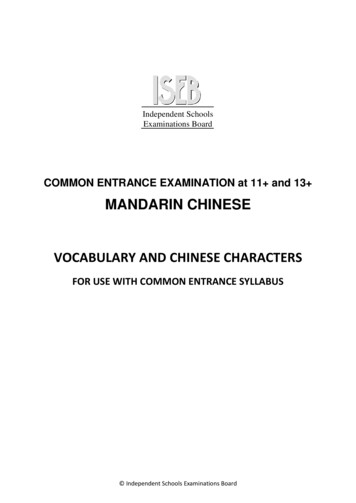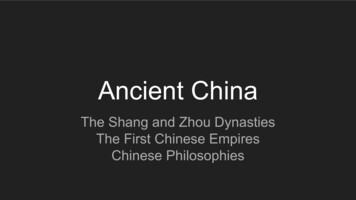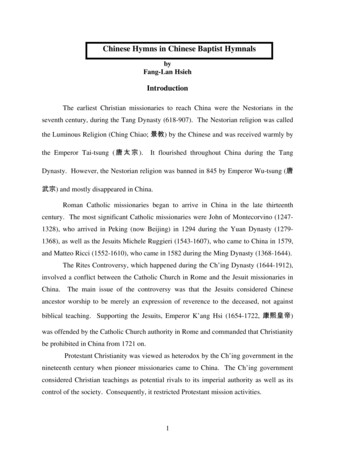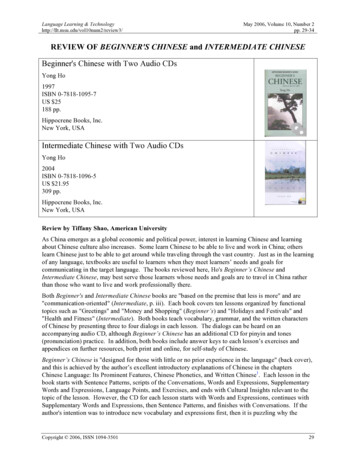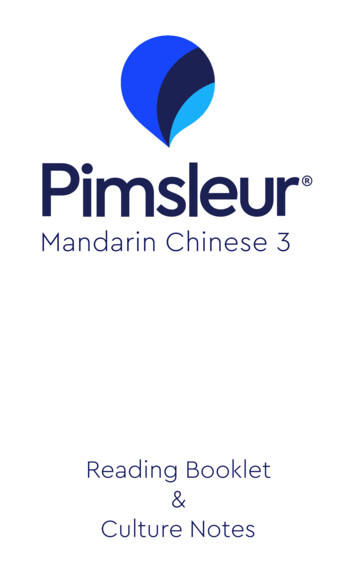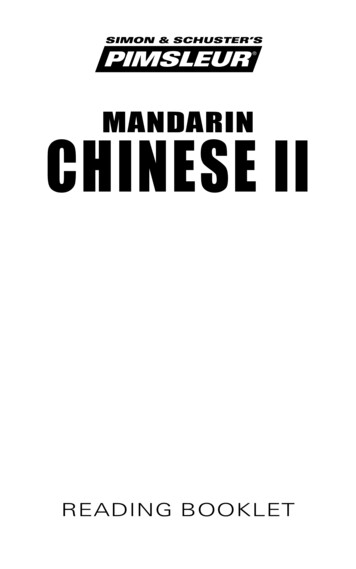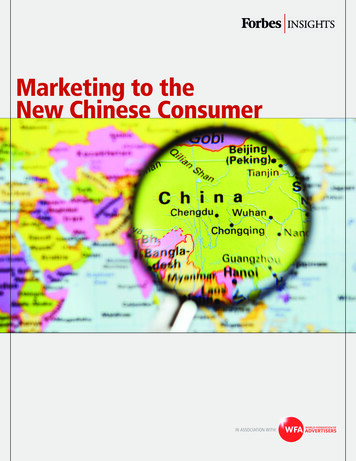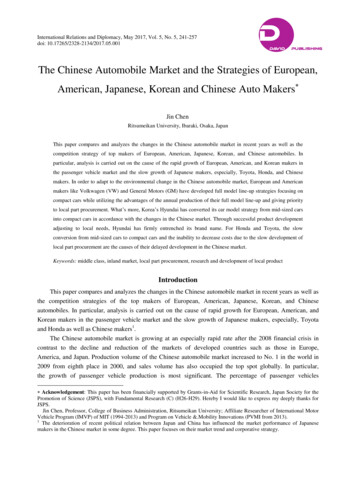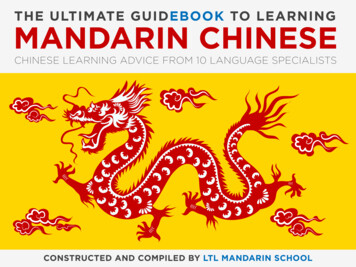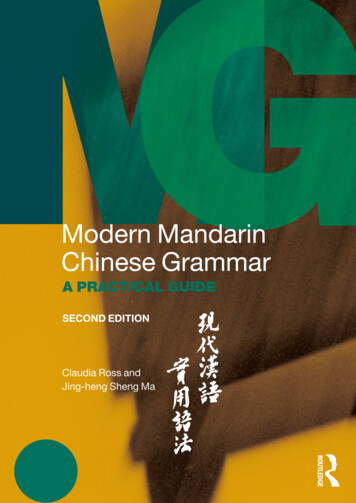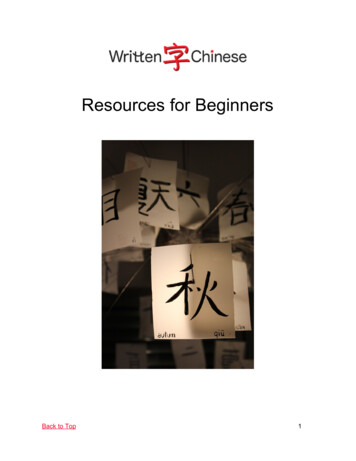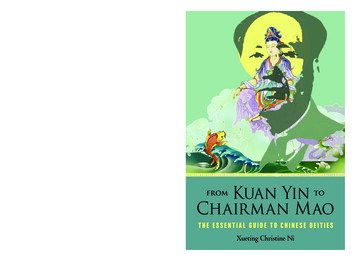
Transcription
rIn addition to exploring the origins and rituals of this eclectic pantheon, thisbook also looks at how, in a country that has undergone a myriad of changesand upheavals, its gods and goddesses have never been more than a whisper away.Get to know Kuan Yin, the goddess of mercy; Zhong Ku, the demon slayer; TianHou, the goddess of the sea; the beloved Monkey King; and a host of otherChinese deities, both ancient and modern.“From Kuan Yin to Chairman Mao is a must-read for anyone who is interested inChina. Xueting Christine Ni has woven history, society, religion, beliefs, and,most importantly, a perspective into the Chinese mind set. A fascinating bookthat gives all of us a better understanding of today’s China.”photo credit: the factory—Ken Hom OBE, chef, author, and BBC presenterXueting Christine Ni was born in Guangzhouduring China’s “reopening to the West” and is a graduate ofthe University of London with a degree in English literature.Her continuing travels and research at Central Universityof Nationalities, Beijing, have given her a unique culturalperspective, bridging her Eastern and Western experiences. Shehas written extensively on Chinese culture and China’s placein Western pop media and continues her literary translationof China to the West, with a mission to help improve understanding of Chineseheritage, culture, and innovation.www.redwheelweiser.comU.S. 18.95from kuan yin to chairman maoFrom Kuan Yin to Chairman Mao recounts the stories of sixty Chinese gods andgoddesses, selected from across the spectrum of China’s mythical beings, deifiedheroes, gods, goddesses, and immortals. They derive from Taoism, Buddhism,Confucianism, and folklore, as well as other traditions’ revered sages andprotective deities. Author Xueting Christine Ni offers fascinating insight intothe complex interweaving of China’s main religions and folklore and the waythe deities have evolved to meet changing challenges, finding their way fromscriptures and statues to spell tags and videogames.Xueting Christine NiWelcome to the Chinese Pantheon!Kuan Yin toChairman Maofromthe essential guide to chinese deitiesXueting Christine Ni
Pr aise forFrom Kuan Yin to Chairman Mao“From Kuan Yin to Chairman Mao is a must-read book for anyone who is interested in China. Xueting Christine Ni has woven history, society, religion, beliefs,and most importantly a perspective into the Chinese mind-set. A fascinatingbook that gives all of us a better understanding of today’s China.”—Ken Hom, OBE, chef, BBC presenter, author ofMy Stir-fried Life and numerous other books“I have yet to be as pleased or as excited as I am at the opportunity to joinin the celebration of Xueting Christine Ni’s debut, From Kuan Yin to ChairmanMao. If you seek a primer text on the Chinese pantheon of divinities, thenlook no further. Luminous and detailed, this is an encyclopedic treasure trovethat now renders the gods and goddesses of Eastern lore accessible to theWest. Edifying, scholarly, and yet a sparkling, mesmerizing read, From KuanYin to Chairman Mao is a personal favorite in my library.”—Benebell Wen, author of The Tao of Craft: Fu Talismansand Casting Sigils in the Eastern Esoteric Tradition“What a marvelous book! From Kuan Yin to Chairman Mao is essential reading foranyone who has stood in bewildered delight in the midst of a Chinese templewondering at the meaning and importance of the statuary that surrounds thevisitor. Xueting Christine Ni’s beautifully written guide to the Chinese pantheon is the sort of book that should be in the hands of any visitor to HongKong or Mainland China, explaining as it does the history, meaning, and continued relevance of the various deities the traveler encounters. And not justin temples. Ni explains how for the most part these figures are all a part of aliving tradition that have significant afterlives in popular culture, from moviesand TV shows to video games and comics. Part of what makes this book sointeresting—and so important—is her incredible knowledge, not just of themystical past but the very vibrant present in which Chinese populations all overthe world continue to practice and expand their rich spiritual traditions.“From Kuan Yin to Chairman Mao opens up the full complexity of Chinese religious life, explaining not just the three religious traditions usually
a ttributed to the Chinese (Buddhism, Taoism, and Confucianism) but alsothe next level of popular religion which embraces a whole cast of generals,courtesans, and wise governors who have all been elevated to important positions in the Chinese hierarchy of gods and spirits. Constantly fascinating,always surprising, and immensely helpful, this is the book many travelers,occultists, and pilgrims have been waiting for.”—Walter Mason, author of Destination Saigon and Destination Cambodia“Xueting Christine Ni has created some enthralling profiles of China’ssprawling cast of deities, from their mythical origins to their manifestationsin 21st-century pop culture. If you want to learn about China’s rambunctious spiritual life, From Kuan Yin to Chairman Mao is a first-class guide.”—Ben Chu, economics editor of The Independent and author of Chinese Whispers“I used to think Chinese mythology is extremely complicated—who would be crazy enoughto write a book trying to explain it? Despite common misconceptions, China is nota monolithic entity with a singular belief system across the vast country, letalone the diaspora. Depending on who you ask, the stories, mythology, eventhe gods themselves can vary across regions and even families. Explaining theChinese gods has always been difficult for Chinese people and even more difficult for Westerners to understand. Xueting Christine Ni has accomplishedwhat very few have done for the common English-speaking audience, providing enough depth to bring insight and deep understanding into the gods,but not so much that the information is bogged down amidst potentiallyconflicting legends. Moreover, she is not afraid to present information thatis controversial, that would create heated friction between Chinese peoplethemselves. From Kuan Yin to Chairman Mao is perhaps the best book for unfamiliar readers to begin gaining familiarity with the spiritual complexities ofthe Chinese gods.”—David Borji Shi, author of North Asian Magic:Spellcraft from Manchuria, Mongolia, and Siberia
Kuan Yin toChairman MaofromThe Essential Guide to Chinese DeitiesXueting Christine NiWEISER B OOKS
This edition first published in 2018 by Weiser Books, an imprint ofRed Wheel/Weiser, llcWith offices at:65 Parker Street, Suite 7Newburyport, MA 01950www.redwheelweiser.comCopyright 2018 by Xueting Christine NiAll rights reserved. No part of this publication may be reproduced or transmitted in any form or by anymeans, electronic or mechanical, including photocopying, recording, or by any information storage andretrieval system, without permission in writing from Red Wheel/Weiser, llc.Reviewers may quote brief passages.ISBN: 978-1-57863-625-9Library of Congress Cataloging-in-Publication Data available upon request.Interior photos/images: While the images reproduced in this book are believed to be in the public domain,there are a few images for which provenance is unknown. In these cases, every effort has been made toresearch and trace the copyright holders and obtain permission to reproduce them in an editorial manner.The publisher apologizes for any errors or omissions and would appreciate any informationregarding the copyright holder for these images.Typeset in CentaurPrinted in CanadaMAR10 9 8 7 6 5 4 3 2 1
IntroductionC hina is a country of paradox . Some in the West perceive it as anancient land of mysticism that still caters to the whims of dragons andspirits. Others, influenced by modern interactions with China, see it as aland where capitalist communism reigns, its relentless citizens operatingwith varying degrees of recklessness for personal gain. In other words,they see it as a reflection of the tension between the Qi Gong (the workof the spirit) and the Ren Gong (the labor of men).The truth, as with so many things, lies somewhere between these twoextremes.The Chinese are a stoic race who have built a civilization that beganby weathering the floods and droughts along the banks of the YellowRiver. The rise and fall of dynasties, the upheavals of revolution, andthe impact of historical tragedies have made the Chinese pragmatic survivors. But none of these have diminished our excitable, whimsical, andhighly emotional nature, which constantly seeks to entrust hopes andfears to some greater being or higher spirit.I was born and raised in the city of Guang Zhou (Canton). Backthen, my family still lived with my paternal grandfather in the labyrinthine alleyways that made up the old city’s residential areas. Here, I wastaken care of by a circle of Po Po—the Cantonese word for “grannies”—who were a living embodiment of traditional Cantonese culture. Onemade mouth-watering Shunde1 cuisine at her coal-heated stove, whileanother loved to listen to Yue Ju (Cantonese opera) on the radio amongstthe traditional carved wooden furniture. They all shared their homeswith an array of porcelain gods, like Kuan Yin, Goddess of UniversalMercy, and Cai Shen, the gods of wealth.I remember Siu Zun, the Po Po who practically raised me whilemy parents pursued their dreams of the New Prosperity. In one cornerof her living room sat a small wooden altar where there were invariably
offerings of fruit throughout the year. The altar featured the usual collection of household deities—Tu Di Ye, the earth god; Men Shen, thedoor guardians; and Fu Shen, Lu Shen, and Shou Xing, the gods ofhappiness. The framed picture in the middle of the altar, however, wasnot of a deity. It was of her late husband. On Qing Ming (the Chinesefestival of the dead), after sweeping his grave and burning offerings ofpaper money, Siu Zun placed roast meats before the altar, accompaniedby incense and prayers. Alongside the deities, she prayed to his spirit tokeep her family safe and bring them prosperity. This was a scene repeatedthroughout the tenement building, the sweet smell of sandalwood smokefilling the corridors and stairwells.Later still, when my parents moved out of the alleys and into modern high-rise apartments, I still visited the old lady at least once a week,until my family moved to England. As an adult, I rediscovered my fascination with these earthy spiritual icons and rituals, which had never reallyleft me. On my visits to Canton, I seek out those winding back alleywaysof my youth, and am delighted to find that the traditional thresholdofferings of oranges and apples, stuck through with incense, still adorndoorways. This native spirituality is still very much alive in China.The Western concept of a Judeo-Christian god, or even a GrecoRoman father god, is fundamentally different from the Chinese idea ofdeities. In Chinese religion, there is no concept of a single omniscientbeing. Rather, there are many gods in the pantheon and, while they aresupposedly divided among the three religions that co-exist in China—Confucianism, Daoism, and Buddhism, or Ru (儒), Dao (道), and Fo(佛)—the boundaries between them are not at all clear-cut.Confucianism developed out of the teachings of the philosopherConfucius, who lived in 500 BCE, during a war-torn era (see chapter13). During his lifetime, Confucius was revered as an advocate for anordered society. Upon his death, his family and students worshipped himin the traditional manner in which the deceased were honored. The sheernumber of his followers raised Confucius to the status of a protectivedeity who watched over his local community. When this was broughtto the attention of the emperor, he knighted Confucius’s family andelevated him to a patron god of the bureaucracy tasked with ensuringxivfrom kuan yin to chairman mao
social harmony in the emperor’s household—which was, of course, theentire state.China’s indigenous religion, Daoism—which literally means “TheWay”—is primarily concerned with the state of existence itself. Daoistphilosophers and alchemists explored their unity with nature and searchedfor the elixir that granted immortality. For the majority of Chinese, however, this faith is intimately connected with everyday life, initially throughshamans or sorcerers of local communities who communed with spiritsto divine the future, invoke rain, and cure diseases. Later, the Dao Shi,priests who lived in villages as well as temples, attended to the needsof the people, dispensing talismans, treating ailments, and performingfuneral rites. A Daoist pantheon emerged when the ambitious ZhangDao Ling (34–156 CE), an enterprising Daoist scholar widely recognized as the founder of Daoism as a religion originally known as TianShi Dao (Cult of the Heavenly Master), turned this native faith into areligion by instating Lao Zi (sometimes called Lao-Tzu) as its mysticalfounder (see chapter 13).Buddhism, on the other hand, came to China from outside its bordersand traditions. It traveled from India to China, where it adapted and diversified into branches of Chinese Buddhism like Zen. Because the development of any Chinese deity is inseparable from the land and the people,however, it was inevitable that the Buddhist deities introduced into Chinawould develop a distinct identity over hundreds of years of evolution.Yet even those who clearly identified themselves as Buddhist, or Daoist, or Confucian had very little problem visiting a temple of anotherdiscipline. Chinese practices within these three separate religions are verymuch linked and mutually reinforcing.There is also a fourth aspect to China’s religious identity—a folkreligion whose gods grew from myths, folklore, and legends. This tradition capriciously took whatever stories it liked from the more establishedfaiths, dropped the less favored parts, and twisted the disparate strandstogether to form new and wonderfully divers
From Kuan Yin to Chairman Mao recounts the stories of sixty Chinese gods and goddesses, selected from across the spectrum of China’s mythical beings, deified heroes, gods, goddesses, and immortals. They derive from Taoism, Buddhism, Confucianism, and folklore, as well as other traditions’ revered sages and protective deities. Author Xueting Christine Ni offers fascinating insight into the .
